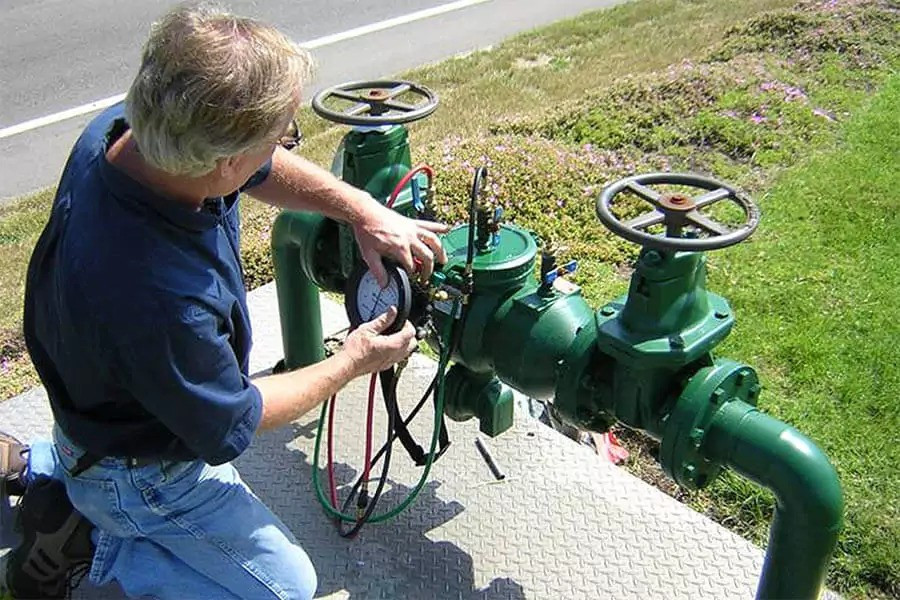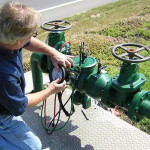In Raleigh, NC, ensuring the safety and quality of drinking water is paramount. Water backflow testing plays a vital role in maintaining this safety by preventing contaminants from flowing back into the public water supply.
In this comprehensive guide, we’ll delve into why water backflow testing is essential for residents in Raleigh and how it protects water quality and public health.
What is Water Backflow Testing?
Water backflow occurs when the water pressure in a plumbing system changes direction, potentially causing contaminated water to flow back into the clean water supply.
To prevent this, backflow prevention devices are installed in water systems. Backflow testing involves inspecting and testing these devices to ensure they are functioning correctly and effectively preventing contamination.
Irrigation system tips for homeowners in Raleigh, NC, are also essential for maintaining the main water quality and system efficiency.
By implementing practices such as regular system inspections, proper maintenance, and adjustments to watering schedules based on seasonal needs, homeowners can ensure the optimal performance of their irrigation systems while protecting the integrity of the water supply.
Importance of Regular Backflow Testing
Regular backflow testing is crucial for several reasons:
- Protecting Water Quality: Backflow testing ensures that water remains free from contaminants, safeguarding public health.
- Compliance with Regulations: The City of Raleigh and local regulations mandate regular backflow testing to comply with safety standards and regulations.
- Preventing Water Contamination: Without proper testing, contaminants such as chemicals, bacteria, or other pollutants could enter the public water supply, posing significant health risks.
Backflow Testing Process
Backflow testing is a crucial procedure to ensure the integrity of water systems and protect public health. Let’s delve into the process step by step, backflow preventer highlighting the key components and importance of each stage.
- Visual Inspection: Before conducting any tests, a certified tester performs a thorough visual inspection of the backflow prevention device. This inspection ensures that the device is properly installed and free from any visible defects or damage.
- Testing Equipment Preparation: Next, the tester prepares the necessary equipment for conducting the backflow test. This may include pressure gauges, test kits, and other specialized tools required to measure the performance of the backflow prevention device accurately.
- Test Initiation: With the equipment in place, the tester initiates the backflow test by following a standardized procedure specified by regulatory authorities. This procedure typically involves simulating various scenarios to assess the device’s effectiveness in preventing backflow.
- Pressure Variations Simulation: During the test, the tester simulates different pressure variations within the water system to mimic real-world conditions. This may include changes in water pressure caused by factors such as water usage patterns or system maintenance activities.
- Measurement and Analysis: As the test progresses, the tester carefully monitors the performance of the backflow prevention device and records relevant measurements. These measurements help evaluate the device’s ability to maintain proper pressure levels and prevent backflow effectively.
- Test Reports Generation: Upon completion of the test, the tester compiles all relevant data and prepares detailed test reports. These reports include essential information such as test results, device condition, and any recommended actions or repairs.
- Compliance Verification: The test reports are then reviewed to ensure compliance with local regulations and standards. This verification process is essential to confirm that the backflow prevention device meets the requirements for safeguarding water quality and public health.
- Recommendations and Follow-Up: Based on the test results, the tester may provide recommendations for maintenance or repairs if any issues are identified. Property owners must address these recommendations promptly to maintain the integrity of their water systems.
- Documentation and Record-Keeping: Finally, all test reports and related documentation are securely archived for future reference. Proper record-keeping is essential for demonstrating compliance with regulatory requirements and facilitating future inspections.
- Scheduling Future Tests: To ensure ongoing compliance and continued protection of the water supply, property owners should establish a regular testing schedule. This helps identify potential issues early and mitigate risks before they escalate.
In essence, backflow testing is a comprehensive process that requires expertise, precision, and adherence to regulatory guidelines.
By prioritizing regular testing and maintenance, property owners can contribute to the overall safety and reliability of the water supply in their communities.
Irrigation Backflow Testing
Irrigation backflow testing is a critical practice aimed at ensuring the safety and purity of water used for irrigation purposes.
By assessing the functionality of backflow prevention devices within irrigation systems, this testing procedure helps mitigate the risk of contaminants flowing back into the clean water supply.
It plays a pivotal role in safeguarding water quality, preserving soil health, and promoting the vitality of plants, crops, and landscaping.
Seasonal irrigation tips for residents in Raleigh, NC, are also crucial in maintaining an efficient and effective irrigation system.
By following seasonal guidelines, such as adjusting watering schedules based on weather conditions and performing routine maintenance tasks, residents can optimize water usage, minimize runoff, and promote healthy plant growth.
Property owners, whether residential or commercial, must prioritize irrigation backflow testing to adhere to local regulations, such as those set forth by the City of Raleigh.
Compliance with these regulations not only ensures the protection of the public water supply but also helps maintain the efficiency and longevity of irrigation systems’ flow of water.
By partnering and assembling with certified professionals specializing in backflow testing and repair, property owners can uphold the integrity of their irrigation infrastructure, minimize contamination risks, and contribute to the sustainable management of water resources.
Benefits of Certified Backflow Testing Services
Choosing certified professionals for backflow testing offers several benefits:
- Expertise: Certified testers have the knowledge and expertise to accurately assess backflow prevention systems and make repairs if necessary.
- Compliance: Certified testing ensures compliance with local regulations and standards, avoiding potential fines or penalties.
- Peace of Mind: Regular testing by certified professionals provides peace of mind, knowing that your water supply is safe and free from contamination.
Why Residents in Raleigh Should Schedule Backflow Testing
Residents in Raleigh should prioritize scheduling backflow testing for their homes or businesses to:
- Ensure Water Quality: Testing ensures that the water flowing into homes and businesses remains clean and safe for consumption.
- Comply with Regulations: Compliance with local regulations is essential to avoid penalties and ensure the safety of the public water supply.
- Prevent Contamination: Regular testing helps prevent potential contamination incidents, and backflow testers and backflow assemblies protect public health and safety.
Conclusion: Protect Your Water Quality with Professional Backflow Testing
Water backflow testing is essential for residents in Raleigh, NC, to protect water quality and public health. By scheduling regular testing with certified professionals like Water Works Unlimited.
Backflow testing and repair in Raleigh residents can ensure compliance with regulations, prevent water contamination, and safeguard their drinking water supply.
Don’t compromise on water safety – give us a call today at (919) 570-7808 to schedule your backflow testing appointment. For certified backflow testing and repair services in Raleigh, NC, Contact Water Works Unlimited today.



